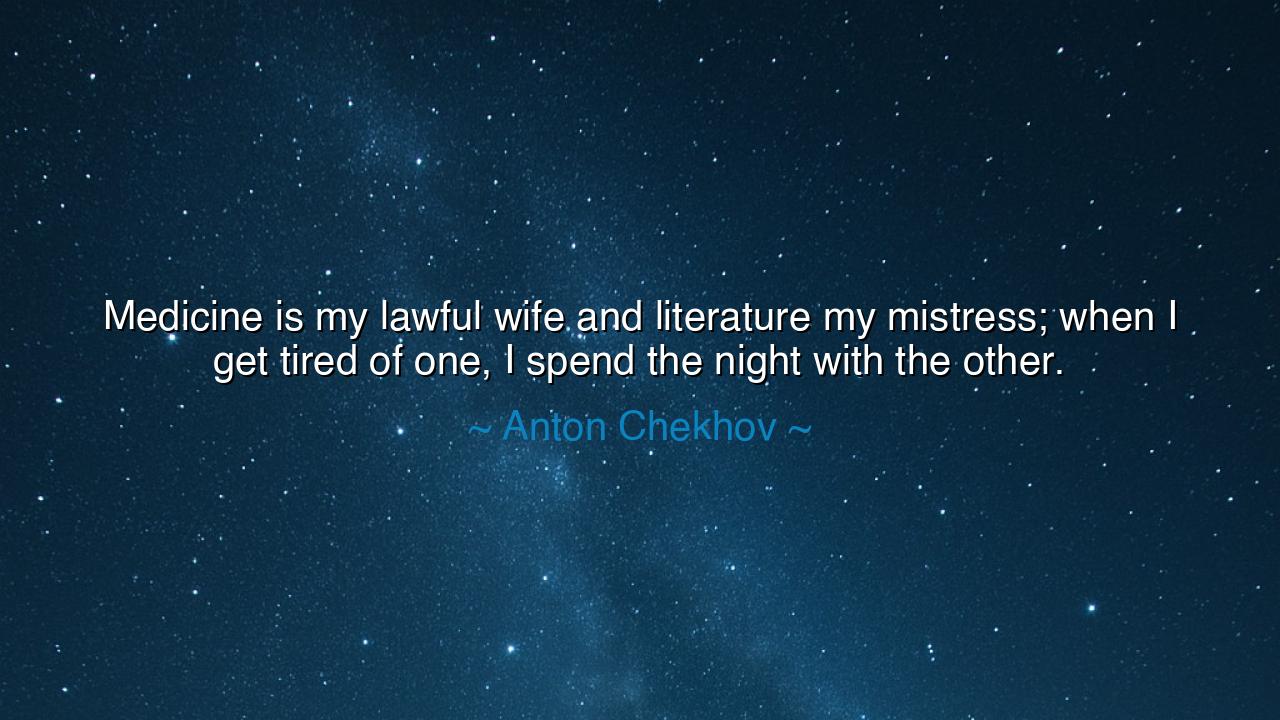
Medicine is my lawful wife and literature my mistress; when I get
Medicine is my lawful wife and literature my mistress; when I get tired of one, I spend the night with the other.






In the great tapestry of life, where the soul seeks both purpose and passion, there are few declarations as evocative and profound as that of Anton Chekhov: "Medicine is my lawful wife and literature my mistress; when I get tired of one, I spend the night with the other." This simple yet poignant sentiment touches upon the very essence of the human condition: the balance between duty and desire, obligation and passion. Chekhov, a physician by profession and a writer by inclination, deftly captures the duality that many of us face in our lives—the need to serve the practical demands of existence while also nurturing the more personal, creative impulses that lie within.
The dual nature of Chekhov’s life and work resonates deeply with the ancients, who often spoke of the need to live with balance. The philosopher Aristotle spoke of the "golden mean," the idea that true happiness lies not in excess or deprivation but in finding a harmonious balance between opposing forces. Chekhov’s quote speaks directly to this ideal, suggesting that one can fulfill the necessary duties of life—represented by medicine—while also indulging in the creative, often whimsical pursuits that bring meaning and joy to the soul, represented by literature. In this, Chekhov presents us with a timeless lesson: that a life fully lived is not one of singular focus but one that embraces both duty and passion.
Consider the lives of Leonardo da Vinci and Michelangelo, two of the greatest artists and thinkers of the Renaissance. Da Vinci was not only a painter and sculptor but also a scientist and engineer, with an insatiable curiosity that led him to explore everything from anatomy to mechanics. Likewise, Michelangelo, while dedicating much of his life to his sculptures and paintings, also engaged deeply with architecture and the human condition in his writings. Like Chekhov, they were men who did not allow themselves to be confined to a single path but instead pursued the many aspects of their humanity, always seeking to balance their obligations with their passions. Their lives remind us that the soul does not thrive in monotony but in diversity and exploration.
To understand Chekhov’s quote more deeply, we must also recognize the importance of work in shaping a person's identity. Medicine, in Chekhov's case, represents a noble, essential craft—one rooted in service to others, a task that requires discipline, commitment, and sacrifice. But literature, in contrast, represents a deeply personal pursuit, one born not of obligation but of the soul’s longing for expression. The image of medicine as the lawful wife suggests that it is the structured, dependable aspect of life, while literature, the mistress, symbolizes the fleeting, passionate love that one cannot resist. This duality is not one of conflict, but of complementary forces—two aspects of life that enrich the soul in different ways.
The relationship between these two forces—duty and desire—is not merely a personal one, but a reflection of the human condition itself. In every life, there exists a struggle to reconcile what we must do with what we yearn to do. There are countless examples of individuals who, like Chekhov, have been forced to balance the demands of their careers with their more personal passions. Marie Curie, for example, was not only a groundbreaking scientist but also a mother, striving to balance her scientific discoveries with the nurturing of her family. Her devotion to both her family and her work speaks to the sacrifice and balance that many of us must strive to maintain in our own lives.
The lesson here is clear: we must not allow ourselves to be bound by a single path, nor should we ignore the duties that life requires. Chekhov’s quote encourages us to honor the responsibilities we have—whether as parents, workers, or citizens—while also recognizing the importance of nurturing our passions. Whether it is through art, literature, music, or any other creative endeavor, we must make room for the pursuits that feed the soul, even as we attend to the practical needs of daily life. Balance is not a luxury, but a necessity for living a life that is both meaningful and rich.
In the end, Chekhov’s words remind us that life is not a single note, but a symphony of experiences, each playing its part. The "lawful wife" of duty and the "mistress" of passion each have a rightful place, and it is through their delicate dance that we find both fulfillment and purpose. Let us, then, as Chekhov did, embrace the contradictions of our lives, recognizing that we are both workers and dreamers, creators and servants. And in this harmony, we will find the strength to live a life of meaning, purpose, and joy.






AAdministratorAdministrator
Welcome, honored guests. Please leave a comment, we will respond soon